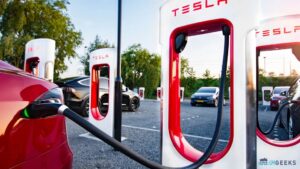Many people still wonder how much they’ll be paying at the charging station despite the fact that the overall cost of owning an electric car is decreasing. Does it resemble a tank of gas? The answer is based on a number of variables, such as where and how you charge.
A Complicated Cost Landscape
Electric cars may be charged via a variety of techniques (EVs). Whichever one you choose will affect how quickly your battery recharges and how much it costs you to run. The cost per kilowatt-hour spent for electricity from the local power grid when an EV owner plugs in at home will be the majority of EV owners’ average cost of charging, along with a mix of public charging stations.
At the time of writing, there are three levels of public EV charging accessible. A totally discharged battery might take days to recharge using Level 1, which is essentially a power socket like you’d use to charge your cellphone. On the other side, DC fast charging (DCFC) stations may give you an 80 percent charge in around 30 minutes, but they are more expensive to use.
You’ll pay a variety of prices. Depending on whatever EV charging station you use, fees range from being free to having a set cost per kilowatt-hour (kWh). All of the main American producers of recharging stations, as well as automakers like Tesla and Ford, have their own applications that customers can use to make payments. The applications provide subscription options, some of which include savings. Therefore, the cost of charging your electric vehicle also depends on the type of vehicle you drive and if you have a membership, such as Electrify America.
How much will the cost of power they use to charge influence their energy bill for EV owners who choose to plug in at home instead? It may also be necessary to establish charging infrastructure, which might add significantly to the cost. The price of charging an electric car at home depends on a number of variables, including how well your car uses power, how many kilowatt hours are in its battery, and how much you drive each day.
There isn’t always the “optimal” approach to charge that results in the most financial savings. The price of charging an electric car will mostly depend on the automobile, the battery, and the driver’s driving style.
Related: What Is the Range of a new electric Car?
Various Public Charging Stations
Some public charging is provided without charge. From a level 1 wall outlet to a standalone level 2 charging station, free stations can take many different forms. The majority of applications that assist in finding one include information on the per-kWh cost and the amount of charge available. Free charging stations are typically located next to commercial establishments, as in the parking lot of a mall or restaurant. The idea is that when inside, individuals may plug in and at least partially recharge.
Public Level 2 EV charging stations are either pay-as-you-go for occasional usage or available for lower kWh rates with a subscription through the provider’s app. A specialized app can be helpful if you anticipate using one sort of charging station more frequently than others. However, the best choice for the majority of individuals is to use any nearby station that is compatible with their car. Pay-as-you-go charging is typically invoiced at the per-kWh price set by the local power supplier.
As a result, you would spend $3.25 for 25kWh of power if you utilized a level 2 charging station in Texas, where the average energy cost is 12.8 cents per kW/h as of March 2022. To put that into perspective, that is almost half the battery capacity of a Tesla Model 3 basic model. In order to compensate drivers for their relative speed, Level 3 charging stations now charge the highest fees. For instance, the typical DCFC price per kWh in California is $.40. That same 25kWh of juice would require $10 to charge at that rate.
In most groups of public charging ports, level 3 stations and other DCFC charging options are offered alongside Tesla Supercharger stations. The greater quantities of power that these stations consume are not compatible with all EVs, so keep that in mind before you connect. You’ll still pay the higher cost without the advantage of a faster recharge.
In the United States, a few few businesses control the majority of the public charging stations, albeit this number is expanding. If drivers use their applications and pay a membership fee, these businesses—which include EVgo, Charge Point, Electrify America, and others—often offer discounted rates at their stations. Depending on the plan they choose and the location in the US where they charge, EVgo bills consumers on a per-minute basis.
Other businesses, like EVCS, provide a set monthly charge for unlimited charging at their stations (with, of course, limitations in the fine print). According to Tree hugger, Americans pay three to six times as much to charge their electric vehicles at a public charging station as they would at home. People should be informed of the costs at nearby public charging stations and choose free ones whenever feasible if they reside somewhere without a charging infrastructure, such as an apartment building or another type of dwelling.
Related: The of power and technology, the new electric car of Kia
Home Charging Is Cheaper (In the Long Run)
As of this writing, the least expensive alternative for EV owners is to charge at home. No equipment installation is required if you have the time to utilize a level 1 charger or already have a 240-volt outlet you can access with your EV’s provided converter cord. You may purchase a level 1-2 charge for your garage and just pay your power supplier on a per-kWh basis. Before you rely on home charging, do the arithmetic since it differs by state.
To receive a level 2 charge at your home if you don’t have a 240-volt outlet, you’ll need to install either a wall socket or a specialized level 2 EV charging station. One’s installation might be expensive, costing on average $1,200. However, if you know you’ll be driving an EV for a while, the initial investment will pay for itself over time in petrol and public charging savings.
The cost of installing home charging equipment can be partially mitigated by a number of federal and state government incentives. Check to see whether you qualify for any in your region since the amount and requirements vary by state. Battery capacity, efficiency, and driving habits are further factors. Similar to a gas tank, the cost to “fill up” a larger battery increases. Smaller battery packs are less expensive than larger-capacity choices, however they have lower mileage per charge.
Let’s take a look at the Ioniq 5 EV from Hyundai as an actual world example. The battery for the basic model is 58 kWh. Therefore, a motorist in Texas, where we’ve determined that the cost per kWh is 12.8 cents, would have to fork out about $7.54 to charge it at home starting from zero. They would have to spend $12.18 at a level 2 public charging station like this one in Houston to recharge a dead battery at the top cost of $0.21/kWh.
Our fictitious motorist would pay $0.32 per minute at the maximum rate of 350kW of power at this DCFC station close to a Walmart operated by Electrify America, which comes to $9.60 for 30 minutes of charge time. However, it’s likely that the battery won’t run out between visits to public charging stations.
According to how much power they really consume or, in the case of per-minute charges, how long they take to charge, the rate charged will vary. In addition to the per-kWh tariff, some stations also charge a session fee of a few dollars. Another expense is any subscription fees you may be paying through a service like the EVgo app.
Related: How we charge to electric cars
Costs Vary Depending on the Driver
So, is it less expensive to refuel an EV than to charge it? Yes, as at the time of writing. Even in regions with higher energy rates, recharging an EV is still less expensive than filling up the petrol tank. In conclusion, the cost of charging an electric automobile varies depending on a number of variables, including the battery’s capacity and the available charging options.
Consider your daily driving distance, the desired EV’s battery capacity, and if you can charge the vehicle at home while looking for an EV. Depending on the cost of electricity in your location, you should decide if it is preferable to use public or home charging stations.
Consider your availability to free stations and how dependably you’ll be able to utilize them if you have to use public ones. The average cost of charging your EV will be determined by each of these variables. The final cost to you will be determined by the arithmetic specific to your driving preferences and requirements.








